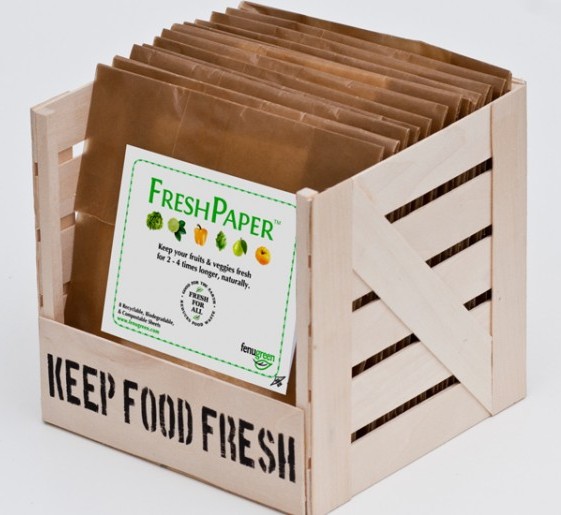Inspiring, Educating and Engaging people in designing sustainable solutions to global challenges. Selected from 1.022 nominations from 73 countries the finalists for INDEX: Award 2013 have been narrowed down to 59 truly inspiring designs. Additionally, it is established that the designers of the world primarily focus on problem solving within 12 global challenges: Education, Empowerment, Energy, Environment & Climate Adaptation, Food, Government, Habitation, Health, Lifestyle, Mobility, Money & New Value and Water.
While the world’s farmers harvest enough food to feed the planet, it is estimated that up to 50% of the global food supply is wasted. Fenugreen is taking on this enormous, yet often overlooked, global challenge with a simple design, FreshPaper. Low-cost, compostable and infused only with organic spices, FreshPaper keeps produce fresh for 2-4x longer, and holds the potential to change how the world keeps its food fresh.
Shukla founded Fenugreen as a social enterprise to bring FreshPaper to those in need across the globe. FreshPaper is a simple sheet of paper infused with organic spices, which inhibit bacterial and fungal growth; amongst others – fenugreek, which inspired the company’s name – and the ingeniously simple idea has the properties to keep fruits and vegetables fresh longer.
As for usage, FreshPaper only needs to be placed wherever the produce is stored – in a refrigerator drawer, fruit bowl, or any other container (in or out of the fridge). Customers have described it as a “dryer sheet for produce” because it does not have to be in direct contact with the produce to work.
designtoimprovelife.dk/simple-sheet
59 finalists for INDEX: Award 2013 revealed
Some of these global challenges have been on the radar of designers for several years. This for example applies to water, health and habitation, and within these ‘old’ challenges we see a clear development.
The global challenge of Food
The global challenge of Food is concerned with sustainable food production, distribution as well as consumption of this vital and resource-heavy commodity. Between the finalist for INDEX: Award 2013, solutions span from new farming and fishing methods over new food products and products reducing food waste.
FreshPaper from India/USA is an example of the latter. It is a simple sheet of kitchen paper treated with an old Indian mixture of spices which when wrapped around fruits, vegetables and other fresh produce ensures that the food will keep fresh up to four times longer than normal, thus reducing food waste, which – according to The Guardian – amounts to 33% of all food produced globally. WikiCell, an edible form of packaging that wraps food, addresses a similar issue, while simutlaneously eschewing the need for superfluous food packaging.
The global challenge of Money & New Value
This global challenge is an entirely new area for designers, arisen in the wake on the financial crisis, Occupy Wall Street and other movements. Here you see M-PESA, a mobile-based money transfer and micro-finance service from Safaricom and Vodacom, which sets new global standards for banking and helps the 62% of adults living in Asia, Africa, Latin America and the Middle East who are currently financially unserved.
You also see several web platforms, where individuals exchange skills, products and services to reduce consumption, to reach a higher degree of use and to reduce waste problems, thus creating new value where formerly no value was found. Examples of such platforms are RecycleMatch, Skillshare and CrowdFlower.
The global challenge of Environment & Climate Adaption
In a world where costs of climate adaptation is expected to exceed $100 billion per year between 2010 and 2050, and where $1.7 trillion is to be invested globally in renewable energy over the next decade, climate and environmental solutions are in high demand. Among the finalists for INDEX: Award 2013, you will thus find Rabalderparken from Denmark, the world’s first combination of rainwater drainage and a skate park addressing the changing climate as well as obesity among youngsters. And from USA comes +POOL, a floating pool for public use that cleans the water in New York’s East River.
The global challenge of Mobility
The challenge of mobility is about creating sustainable ways to transport people and goods in local and global contexts, and includes solutions of individual mobility as well as solutions aimed towards collective mobility. Within personal mobility, we see another example from USA: The computer-generated and 3D printed Bespoke Fairings, a ‘cover’ for prosthetics allowing for personal expression of style for amputees, of which USA alone accounts for 65.000 new cases each year. In the same category, we admire the Wilmington Robotic Exoskeleton, a full-size robotic skeleton providing mobility for the 2% of the world’s population that are currently paralyzed.
Moving from individual mobility to collective mobility, we have enjoyed the ambitious Dutch design Smart Highway, a highway sporting both a futuristic technology that visually shows the car driver if the road is icy or wet, a special lane that charges electrical cars and street lamps powered by the sun. In the coming years, these innovative ideas will most likely trickle down markets to provide safer roads – also for developing countries.
From Zambia comes finalist Riders for Health which – via motorcycles and with specially designed equipment bags – ensure mobility for health- and medical workers in a country with clipped infrastructure. Also, we have seen Getaround, a Canadian car sharing system with huge economic incentives for car owners.
The global challenge of Lifestyle
Within the lifestyle challenge are designs that are expected to change our lives in the same way that computers, cell phones and cars did it, thus providing yet unknown possibilities for improving life. An example of this is the much talked about Google Glass, a computer built into a pair of glasses making augmented reality a part of daily life, thus providing new virtual information layers on top of the ‘real reality’ that we know now. MakerBot Replicator™ 2 3D Printer is another example, building on the first generation of 3D printers by providing a new step towards the day where we print our products at home. And finally, Raspberry Pi, a computer the size of a credit card ensuring children’s knowledge of coding which will be paramount to master in the near future.
The global challenge of Education
Education is a fundamental human right and essential for the exercise of all other human rights. It promotes individual freedom and empowerment and yields important development benefits. Still, currently 61 million children are out of primary school.
Several finalists for INDEX: Award 2013 address this important challenge from different angels: The Typeface Dyslexie is a typeface designed by a dyslexic graphic designer potentially enabling the 5-10 % of any population that Wikipedia asses as burdened by dyslexia to read. Last but not least Coursera: Learning without limits is bringing online, Ivy-league education from the world’s best teachers to millions globally – for free.
Above, you have read a brief introduction to 21 of the 59 selected finalists for INDEX: Award 2013 addressing 7 global challenges.




